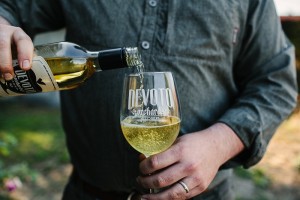Sebastopol’s Devoto Orchards Cider is releasing its 2013 “Save the Gravenstein” hard cider, crafted primarily from Sonoma County’s signature apple. The fruit is all grown on the Devoto family’s orchards. They describe it as “a semi-dry, locally grown and produced, food-friendly cider with an elegant modern visual brand appeal.”
“Two generations ago, back when apples were king, we planted ourselves and 6,500 apple trees in Sebastopol, California. Times have changed and most of Sonoma County’s orchards have been replaced with vineyards, taking with them the centuries-old Gravenstein. But we’ve held our ground and tend to 50+ heirloom apple varieties on 26 organic acres,” owners Jolie Devoto-Wade and Hunter Wade explain in their release notes.
The cider is 95 percent Gravenstein with a splash of Akane, Burgundy, Hubbardston Nonesuch, Pink Blush, and Pink Pearl to round it out. It comes in at 6.9 percent alcohol by volume, comparable to mid-range IPAs or other craft brews in strength. Most of the orchard’s other ciders focus more on blends of other varieties grown at the orchard. One cider, called Backyard, is 100 percent Gravenstein, but has the unusual distinction of being made from unwanted apples “rescued” from backyard trees from area residents, apples that otherwise would have gone to waste. The proceeds from that batch go to support Slow Food Russian River.
Devoto is making 1,650 cases of the new Save the Gravenstein in 750 ml bottles, which should retail for around $12.99 each, though prices may vary by retailer. The bottles are available at retailers around the Bay Area; in Sonoma County they are in Pacific Market, Oliver’s Markets, G&G’s Markets, Andy’s Produce, Petaluma Market, Vine and Barrel, Rincon Valley Wine and Craft Beer. Shawn Riley, the beer buyer for Oliver’s Markets called the cider “amazingly crisp, with a lovely fresh Gravenstein tartness, complemented by a great dry finish,” according to the release notes.
A handful of restaurants have the bottles in stock as well, according to Devoto, including Backyard in Forestville, Bistro 29 in Santa Rosa, and Woodfour Brewing Company and Zazu Kitchen + Farm, both in the Sebastopol’s Barlow district. Devoto will also sell bottles at the farmers markets where they offer other products. A list of those are here.
Devoto is one of a growing number of cider producers in Sonoma County – there are at least five in the county, including California Cider, maker of the Ace line, which is a major player nationally. Smaller producers include Devoto, Tilted Shed and Murray’s Cyder. The latest addition is Sonoma Cider in Healdsburg, which is rolling out in a big way later this year in eight states, including the West Coast and the vicinity of Chicago.
There was some interesting discussion about cider at this week’s first-ever Sonoma County Beer, Cider, and Spirits conference in Santa Rosa, though obviously most of the talk was about beer. The Devotos were there pouring, but the only cider-industry speaker was David Cordtz, owner of Sonoma Cider. He talked a little about how cider makers are trying various things to interest the consumer, using unusual heirloom varities, such as Devoto and Tilted Shed are doing, or experimenting with barrel aging and other techniques pioneered by craft beer brewers. Both Sonoma Cider and Tilted Shed are playing with some barrel aging.
“It doesn’t have to be fermented apple juice,” Cordtz said. “It can be all varieties of things.”
One of the interesting splits in the cider industry is where the apples come from. Because Sonoma County’s apple industry has sagged so far, there simply isn’t enough fruit for a major operation to source the apples locally. A large scale roll-out such as Sonoma Cider means Cordtz has to buy his apples from Washington state. As owners of an orchard who are willing to start fairly small, Devoto can supply itself with all Sonoma county fruit. Tilted Shed, meanwhile, tells me they are contracting with local producers, though they do plan to supply their own fruit eventually, but their new orchard, packed with various heirloom varieties, isn’t quite ready to produce apples.
– Sean Scully


 buyer at Fircrest Market in Sebastopol and the administrator of the NorCal Beer Geeks group on Facebook.
buyer at Fircrest Market in Sebastopol and the administrator of the NorCal Beer Geeks group on Facebook.